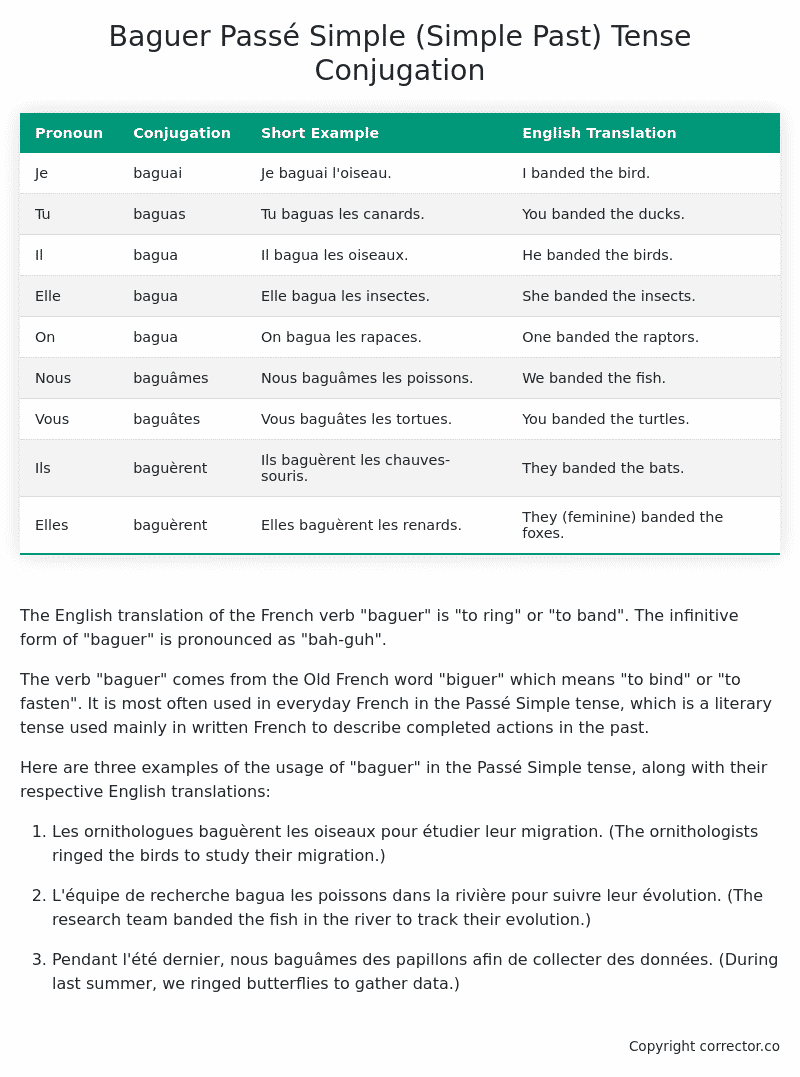Passé Simple (Simple Past) Tense Conjugation of the French Verb baguer
Introduction to the verb baguer
The English translation of the French verb “baguer” is “to ring” or “to band”. The infinitive form of “baguer” is pronounced as “bah-guh”.
The verb “baguer” comes from the Old French word “biguer” which means “to bind” or “to fasten”. It is most often used in everyday French in the Passé Simple tense, which is a literary tense used mainly in written French to describe completed actions in the past.
Here are three examples of the usage of “baguer” in the Passé Simple tense, along with their respective English translations:
-
Les ornithologues baguèrent les oiseaux pour étudier leur migration.
(The ornithologists ringed the birds to study their migration.) -
L’équipe de recherche bagua les poissons dans la rivière pour suivre leur évolution.
(The research team banded the fish in the river to track their evolution.) -
Pendant l’été dernier, nous baguâmes des papillons afin de collecter des données.
(During last summer, we ringed butterflies to gather data.)
Table of the Passé Simple (Simple Past) Tense Conjugation of baguer
| Pronoun | Conjugation | Short Example | English Translation |
|---|---|---|---|
| Je | baguai | Je baguai l’oiseau. | I banded the bird. |
| Tu | baguas | Tu baguas les canards. | You banded the ducks. |
| Il | bagua | Il bagua les oiseaux. | He banded the birds. |
| Elle | bagua | Elle bagua les insectes. | She banded the insects. |
| On | bagua | On bagua les rapaces. | One banded the raptors. |
| Nous | baguâmes | Nous baguâmes les poissons. | We banded the fish. |
| Vous | baguâtes | Vous baguâtes les tortues. | You banded the turtles. |
| Ils | baguèrent | Ils baguèrent les chauves-souris. | They banded the bats. |
| Elles | baguèrent | Elles baguèrent les renards. | They (feminine) banded the foxes. |
Other Conjugations for Baguer.
Le Present (Present Tense) Conjugation of the French Verb baguer
Imparfait (Imperfect) Tense Conjugation of the French Verb baguer
Passé Simple (Simple Past) Tense Conjugation of the French Verb baguer (You’re reading it right now!)
Passé Composé (Present Perfect) Tense Conjugation of the French Verb baguer
Futur Simple (Simple Future) Tense Conjugation of the French Verb baguer
Futur Proche (Near Future) Tense Conjugation of the French Verb baguer
Plus-que-parfait (Pluperfect) Tense Conjugation of the French Verb baguer
Passé Antérieur (Past Anterior) Tense Conjugation of the French Verb baguer
Futur Antérieur (Future Anterior) Tense Conjugation of the French Verb baguer
Subjonctif Présent (Subjunctive Present) Tense Conjugation of the French Verb baguer
Subjonctif Passé (Subjunctive Past) Tense Conjugation of the French Verb baguer
Subjonctif Imparfait (Subjunctive Imperfect) Tense Conjugation of the French Verb baguer
Subjonctif Plus-que-parfait (Subjunctive Pluperfect) Tense Conjugation of the French Verb baguer
Conditionnel Présent (Conditional Present) Tense Conjugation of the French Verb baguer
Conditionnel Passé (Conditional Past) Tense Conjugation of the French Verb baguer
Conditionnel Passé II (Conditional Past II) Tense Conjugation of the French Verb baguer
L’impératif Présent (Imperative Present) Tense Conjugation of the French Verb baguer
L’impératif Passé (Imperative Past) Tense Conjugation of the French Verb baguer
L’infinitif Présent (Infinitive Present) Tense Conjugation of the French Verb baguer
L’infinitif Passé (Infinitive Past) Tense Conjugation of the French Verb baguer
Le Participe Présent (Present Participle) Tense Conjugation of the French Verb baguer
Le Participe Passé (Past Participle) Tense Conjugation of the French Verb baguer
Struggling with French verbs or the language in general? Why not use our free French Grammar Checker – no registration required!
Get a FREE Download Study Sheet of this Conjugation 🔥
Simply right click the image below, click “save image” and get your free reference for the baguer Passé Simple tense conjugation!

Baguer – About the French Passé Simple (Simple Past) Tense
Formation
Usage
Narration
Historical Context
Interactions with other tenses
Passé Composé
Imparfait
Conditional and Subjunctive
Summary
I hope you enjoyed this article on the verb baguer. Still in a learning mood? Check out another TOTALLY random French verb conjugation!


